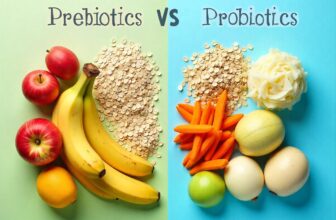
Pregnancy is an exciting time, but it’s also a period when your body undergoes incredible changes. While you’re nurturing a new life, taking care of your own health—particularly your gut health—is essential. Your gut plays a vital role in digestion, immunity, and even mood regulation, making it an important focus during pregnancy. 🍼✨
This guide will explore how gut health influences pregnancy and provide practical tips to help you thrive.
The Gut-Pregnancy Connection: Why Gut Health Matters
Your gut microbiome, a community of trillions of bacteria and microorganisms, impacts many aspects of your health. During pregnancy, these microbes influence digestion, nutrient absorption, immunity, and even your baby’s health. Keeping your gut balanced supports a smoother pregnancy and helps reduce complications. 🌱💪
How Gut Health Impacts Fertility
A healthy gut is essential for fertility. An imbalance in gut bacteria can lead to inflammation, which may disrupt hormonal balance and ovulation. Addressing gut health early can improve your chances of conception and create a healthy foundation for pregnancy. 🌟
Changes in Your Gut Microbiome During Pregnancy
Pregnancy naturally alters your gut microbiome. In early pregnancy, hormone shifts may cause bloating and changes in digestion. Later, your microbiome adapts to support nutrient transfer to your growing baby. Understanding these changes can help you manage common pregnancy symptoms like constipation and nausea.
Table 1: Common Gut Changes During Pregnancy and Tips to Manage Them
| Gut Change | Symptom | Management Tips |
|---|---|---|
| Hormonal Shifts | Bloating | Stay hydrated; eat small, frequent meals |
| Slower Digestion | Constipation | Increase fiber intake; stay active |
| Altered Microbiome | Nausea, gas | Include probiotics; avoid trigger foods |
Complications Linked to Poor Gut Health in Pregnancy
Imbalances in gut bacteria are associated with increased risks of pregnancy complications such as gestational diabetes, preeclampsia, and preterm birth. Maintaining gut health can lower these risks and support a healthier pregnancy. 🌸
Probiotics and Prebiotics During Pregnancy
Probiotics, found in yogurt, kefir, and supplements, introduce beneficial bacteria to your gut. Prebiotics, found in foods like bananas and onions, nourish these bacteria. Including both in your diet can enhance gut health and support your immune system during pregnancy. 🥛🍌
Table 2: Sources of Probiotics and Prebiotics
| Probiotics | Prebiotics |
| Yogurt | Bananas |
| Kefir | Onions |
| Fermented Vegetables | Garlic |
| Probiotic Supplements | Whole Grains |
Supporting Baby’s Gut Health Before and After Birth
Your gut health directly influences your baby’s microbiome. During delivery, your baby is exposed to your bacteria, which seeds their gut. Eating a gut-friendly diet and avoiding unnecessary antibiotics during pregnancy can give your baby the best start. 👶💖
Healing Your Gut While Pregnant
If you suspect gut imbalances, pregnancy-safe strategies can help:
- Eat Fiber-Rich Foods: Whole grains, fruits, and vegetables keep your gut moving.
- Stay Active: Gentle exercise supports digestion.
- Avoid Processed Foods: Reduce sugar and refined carbs to prevent feeding harmful bacteria.
Leaky Gut and Pregnancy: What You Need to Know
Leaky gut occurs when the gut lining becomes permeable, allowing toxins to enter the bloodstream. This condition can lead to inflammation and impact pregnancy outcomes. Managing stress, eating anti-inflammatory foods, and incorporating probiotics can help. 🛡️
Postpartum Gut Health: Recovery and Renewal
After delivery, your gut needs time to recover. The stress of childbirth and hormonal shifts can disrupt your microbiome. Continue eating a balanced diet, stay hydrated, and consider probiotics to restore gut health and support postpartum recovery. 🤱
Key Strategies to Improve Gut Health During Pregnancy
- Eat Diverse Foods: A variety of fruits, vegetables, and whole grains promotes microbiome diversity.
- Stay Hydrated: Water aids digestion and prevents constipation. 💧
- Focus on Fermented Foods: Include kimchi, sauerkraut, and yogurt.
- Consider Supplements: Consult your doctor about pregnancy-safe probiotics.
- Get Enough Sleep: Sleep supports overall health, including your gut.
References
- Rautava, S., Luoto, R., Salminen, S., & Isolauri, E. (2012). “Microbial contact during pregnancy, intestinal colonization, and human disease.” Nature Reviews Gastroenterology & Hepatology.
- Koren, O., Goodrich, J. K., Cullender, T. C., et al. (2012). “Host remodeling of the gut microbiome and metabolic changes during pregnancy.” Cell.
- Martinez de Tejada, B. (2020). “Antibiotic use and the development of the maternal and infant gut microbiome.” Frontiers in Cellular and Infection Microbiology.
- Aagaard, K., Ma, J., Antony, K. M., et al. (2014). “The placenta harbors a unique microbiome.” Science Translational Medicine.
By prioritizing your gut health during pregnancy, you’re not only supporting your own well-being but also setting the foundation for your baby’s long-term health. A few mindful changes can go a long way in ensuring a thriving pregnancy and motherhood journey. 💕






